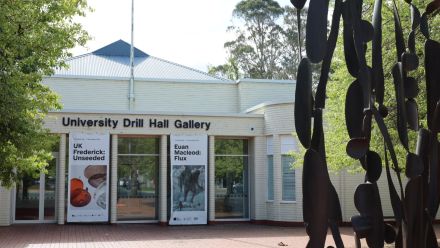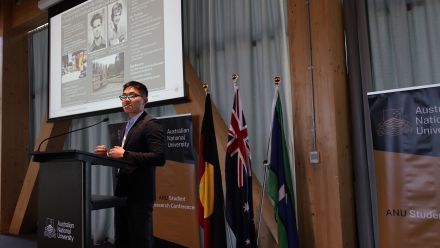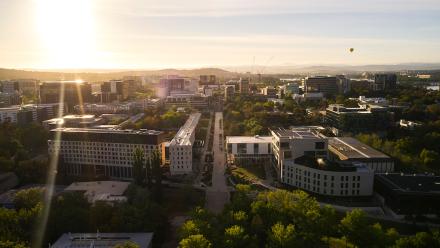Rob Wiblin
The opportunity to work at the centre of a movement I deeply believe in, surrounded by a group of very talented people who share my values, is life-changing. I literally danced around my room when I got the call.
We recently had the chance to sit down with rising young alumnus Rob Wiblin (BSc/BEc (Hons) ’12), Executive Director of the Centre for Effective Altruism in Oxford. We reminisced with Rob about his time at ANU, found out more about his career in philanthropy which has seen him move to the UK, discussed effective altruism and learnt about some of the biggest challenges facing the philanthropic sector.
What was the most interesting thing you did at ANU?
The most extreme experience I had was editing the student magazine back when there were only two editors, which was crazy in retrospect. Finding 16 pages of content worth publishing every two weeks as a full-time student was intense, to say the least. On top of that you had to find advertisers to pay for it all!
I learnt a lot about how to write and edit quickly. I recall a lot of all-nighters adding and removing words to get articles to fit on the damned page! I met some of the most talented people I know today as contributors to Woroni that year. It also made me a lot more ambitious about what I thought I could achieve next.
How has your ANU experience shaped your life experiences and achievements?
I spent six years at ANU, completing two degrees and then honours. That seems like a long while spent as a full-time undergraduate, but I think it was time very well spent! I was lucky enough to be supported on a National Undergraduate Scholarship, which meant I didn’t have to find a job until later in my degree. A lot of what got me where I am today was my own constant online reading outside of class - something I don’t think would have otherwise been possible.
I was also fortunate to meet a lot of fellow students who enjoyed debating as much as I did. One year I joined every political club on campus, which helped put me in touch with a lot of thoughtful people with a wide range of ideas. We would constantly share and discuss links to articles on all manner of things by email and social media: philosophy, economics, science, and so on. I also learnt a lot about how to write well, or at least quickly, on Facebook.
You moved to the UK to pursue your career. What advice would you give to alumni who want to pursue a global career or who are contemplating a move overseas? What challenges did you face?
I had to give away everything that wouldn’t fit in my suitcase, which naturally I ended up doing the day before my flight! But I would certainly recommend ANU graduates work overseas at some point. Australia has many things going for it, but there is a level of intensity in hubs like Oxford, New York or the Bay Area that is hard to find in Australia. That said, I know people who have moved and then found it difficult to find a suitable job. Australia has high salaries and low unemployment, so it’s a good place to launch your career. I suggest trying to move once you are a few years in, have accumulated some savings and can get good job offers while still employed in Australia. Keep in mind the UK and many other European countries have Youth Mobility agreements with Australia. This has made it easier for the UK to hire Australians than any other group outside the EU. You have to apply before you turn 30 though!
Why do you believe it’s important for people to be philanthropic?
The simplest reason is that donations can save or dramatically improve other people’s lives. has found that $3,000 given to the Against Malaria Foundation can prevent a young child dying of malaria through insecticide-treated bed-net distribution. That $3,000 could also deworm about 6,000 school children, ensuring they don’t suffer painful and revolting intestinal parasites that significantly worsen their school attendance and learning. These numbers aren’t misleading promotional figures, but instead are adjusted to accurately reflect what additional donations will actually buy. The benefit of these basic healthcare services to people 40-times poorer than me, is clearly vastly greater than any enjoyment I could hope to get from an extra $3,000.
I know several ordinary people who, motivated by these figures, give away over half of their income. Far from making their lives more difficult, doing so gives them a sense of meaning and purpose that they couldn’t buy any other way. The idea that they are saving many lives every year, and the challenge of finding the best place to five, is thrilling. Identifying as part of the effective altruist movement means they are part of a very friendly and stimulating community, both online and wherever they travel.
What have some of your career highlights been?
Finding out I had an offer to do research for the (CEA) was incredibly exciting. The opportunity to work at the centre of a movement I deeply believe in, surrounded by a group of very talented people who share my values, is life-changing. I literally danced around my room when I got the call.
Being the first speaker at this year’s Effective Altruism Summit in Berkeley, just before billionaire philanthropist Peter Thiel talked about his new book Zero to One, was very exciting and a bit nerve-racking! Speaking to effective altruist chapters around the world is always inspiring and reminds me of how many people are counting on us to produce outstanding research to guide their career and giving decisions.
You are still so early in your career and you have already achieved so much. What do you plan to do with your career long-term?
I want to continue playing a leadership role in the effective altruist movement long-term. There are a number of ways I might do that.
Continuing to connect funders and founders in the effective altruist movement, with the goal of expanding the number of projects we can launch, is the most likely. Our community has a lot of entrepreneurial members with outstanding ideas. We also have a lot of members ‘earning to give’, who want to fund projects that might change the world in a big way. Unfortunately, there are major legal and logistical hurdles that prevent most people getting their innovative for-profit or non-profit idea off the ground. CEA can help reduce those barriers.
Another option would be to take a more public role promoting key effective altruist ideas through speaking tours and media appearances, if those approaches seem to work.
A third possibility is for me to go back and do an economics Masters or PhD, and move into a public policy research and outreach role in a new think tank.
Rob Wiblin in conversation with Fi Preston, Alumni Officer.
Interested in working in the UK?
If any alumni are interested in moving to the UK, The Centre for Effective Altruism is currently looking for outstanding individuals to fill some . Rob hopes several of these posts can be filled by ANU alumni, so apply now!
Meet Rob Wiblin
Rob Wiblin will be at ANU in March. For your chance to hear him speak, contact us alumni@anu.edu.au.


